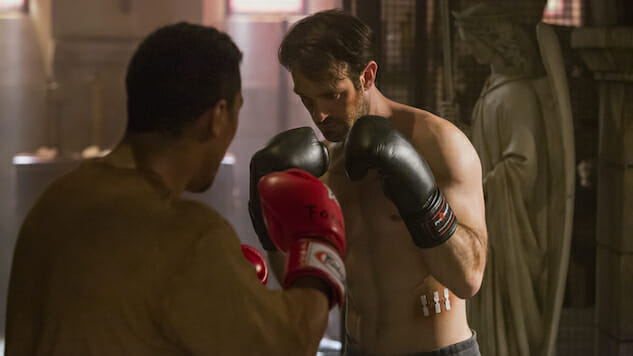Too Many Superheroes: Why We Keep Coming Back to Marvel, Even When We Shouldn’t
Photo: Cara Howe/Netflix
The MCU might have characters suspended in the quantum realm, or bending space-time and becoming intra-dimensional multiverse cosmonauts, but on balance, I might be ready to conclude that they have not changed the basic reality that TV is bound by the laws of classical physics, especially my most often invoked one, the second law of thermodynamics: In a closed system, total entropy cannot decrease over time.
In other words, shit gets old. Old and tired.
It would be hard to understate my admiration for the recently departed Stan Lee, and I’m not even a comics gal. He had a totally unfettered imagination, an enviably prodigious output, and a good heart. His massive oeuvre was (is) grounded in needful and righteous ideas: That everyone is the hero of his or her own story, that the battle of good versus evil plays out everywhere, all the time, largely in mundane little ways among people who are flawed and complicated; that power transcends and also corrupts; that people working together can accomplish real change. That we can turn our wounds into our power sources. It’s been fun to see screen wizardry finally catch up with Lee’s imagination, and it’s understandable that this would generate a lot (wow, a lot) of producers green-lighting origin stories and crossovers and spinoffs in an endless, Spiderman-worthy web of movie and TV minutes.
But as Marvel adaptations have proliferated, it’s become clear that they aren’t created equal—that not every character is worth his or her own origin story series just because that character was scribbled across the pages of a comic book at some point in the last century. After a while, the 10,000 iterations of “Alienated person develops superpowers as a result of accident, experiment, injury or, occasionally, doomed heroic gesture” and “ragtag team of misfits with intriguing edge team up to defeat large looming forces of evil” start to get paler and thinner, to feel like they’ve been done before. Because they have.
So, the two questions for the philosophers are perhaps, “Why, why, why must everything be about superheroes?” and “Have we achieved Marvel (or Marvel-DC, let’s be fair, but for now I’m focusing on the Stan-iverse) Entropy Syndrome?”
Recent weeks have seen the mercy killing of Iron Fist and the cancellation of the more ambiguous Daredevil. Netflix also put the kibosh on Luke Cage, which I would love to imagine was done in a spirit of leaving the party while everyone was still having fun: It was the Marvel-Netflix stalactite with the most nuance. But that principle is nearly nonexistent as long as there is an identifiable fan base, so we’ll assume Luke Cage was discontinued in spite of its Most Improved status, and not because of it. (There are, of course, clear business considerations at play here—namely, that Netflix doesn’t own the Marvel properties it distributes, and that Disney, soon to launch its own, competing streaming platform, does—but this is an essay on the state of Marvel’s TV “aesthetic,” as it were.)
In the Marvel-ABC constellation, the attempt to conclude Agents of S.H.I.E.L.D. sputtered because no one was ready to leave that party. (Thankfully, Inhumans received a peaceful burial.) Hulu is about to drop Season Two of Marvel’s Runaways, and… well, I confess I am not sure why, but there it is.) Season Two of Marvel’s Cloak and Dagger, on Freeform, is currently in production. And because the universe (like corporate ledgers) demands balance, the Disney side of things is still ramping up, with TV spinoffs and side-hustles forking off cinematic characters from Vision and the Scarlet Witch (one imagines an Enhanced Joanie Loves Chachi) to a vehicle for Tom Hiddleston’s (admittedly fabulous) portrayal of Norse trickster-god, Loki. The Marvel Studios clutch of TV-eggs will have stratospheric budgets, big-screen names, and probably greater artistic unity with the movie constellation than… well, than Runaways, which has bupkiss tying it to the MCU other than the fact that it did technically originate in the Marvel On The Page Universe.
-

-

-

-

-

-

-

-

-

-

-

-

-

-

-

-

-

-

-

-

-

-

-

-

-

-

-

-

-

-

-

-

-

-

-

-

-

-

-

-








































